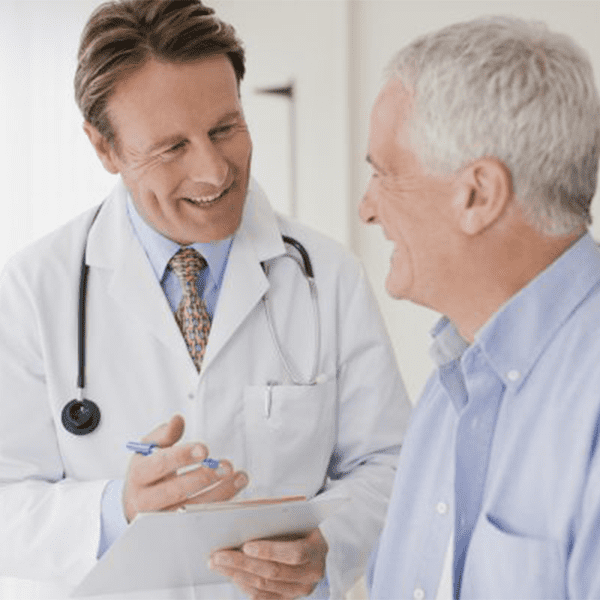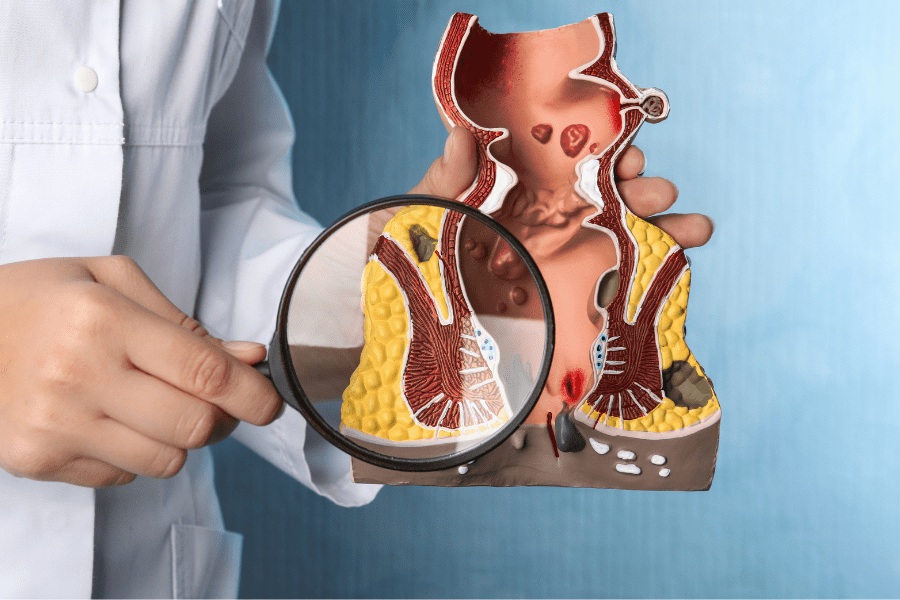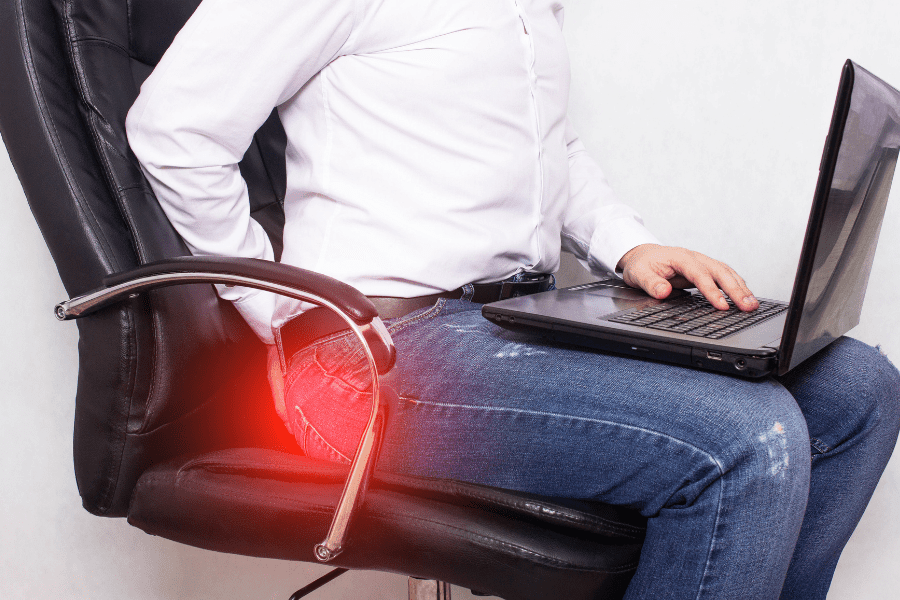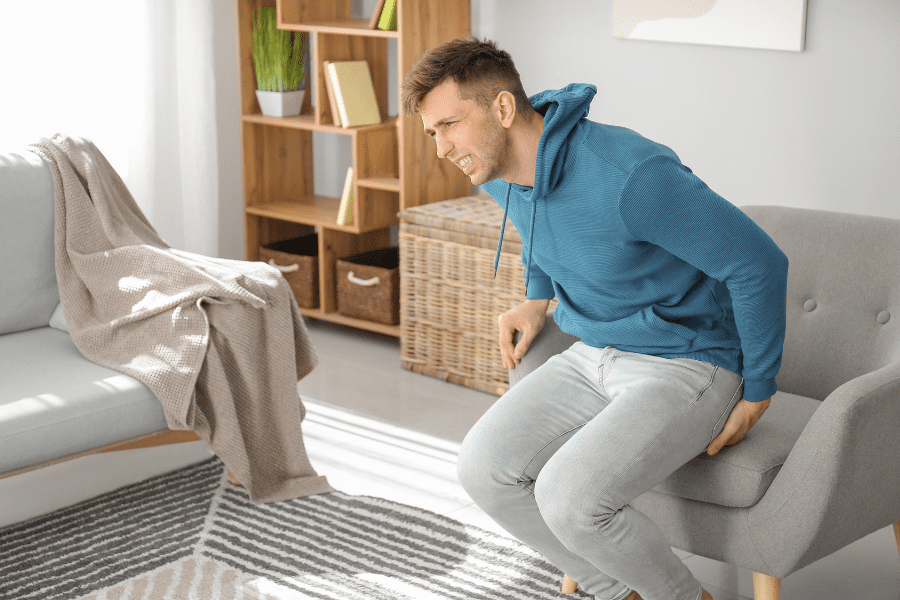Hemorrhoids
- What is a hemorrhoid?
- What are the symptoms of hemorrhoids?
- What causes hemorrhoids?
- Can I manage hemorrhoid symptoms on my own?
- What kind of treatments can help with hemorrhoids?
- When should I see a doctor about hemorrhoids?
A hemorrhoid is a swollen vein in or around the anus or rectum. When these veins wear out or become irritated, they can swell in size and bulge on the surface of your skin—the resulting bump is a hemorrhoid.

What Is a Hemorrhoid?
 A hemorrhoid is a swollen vein in or around the anus or rectum. When these veins wear out or become irritated, they can swell in size and bulge on the surface of your skin—the resulting bump is a hemorrhoid.
A hemorrhoid is a swollen vein in or around the anus or rectum. When these veins wear out or become irritated, they can swell in size and bulge on the surface of your skin—the resulting bump is a hemorrhoid.
As a vascular condition, hemorrhoids are similar to varicose veins and protrude from the skin, causing discomfort. Developing hemorrhoids is nothing to be ashamed of—for many people, they’re just a normal part of life. Nearly one in 20 adults experiences hemorrhoids during their lifetime. They affect women and men equally and are more likely to occur in individuals over the age of 50.
There are two types of hemorrhoids:
- External (they produce a bump under the skin near the anus)
- Internal (these occur in the interior lining of the lower rectum and anus)
Internal hemorrhoids do not manifest or bulge on the outside of the body and can be challenging to identify without a doctor. External hemorrhoids cause a slight bulge on the skin around your anus and are easily recognizable. In some cases, external hemorrhoids may not be visible but will still cause a distinct burning sensation in or around a patient’s rectum.
Patients can develop one or both types of hemorrhoids simultaneously.
What Are the Symptoms of Hemorrhoids?
Some patients can develop hemorrhoids without showing symptoms. Even if you don’t have symptoms, a doctor should still be able to identify them during your annual exam. However, hemorrhoids often make themselves known through several uncomfortable and frequently painful symptoms, including:
- Bleeding or blood spots when you wipe
- Burning
- Discomfort
- Itching
- Painful bowel movements
- Swelling around the anus
These symptoms are typical for external hemorrhoids—but what about internal hemorrhoids? The symptoms you have to look out for are slightly different.
One of the major signs of internal hemorrhoids is rectal bleeding during bowel movements. However, because the swollen vein is deeper inside the rectum (where there are fewer nerve endings), you may not experience discomfort or pain to the same degree as external hemorrhoids.
What Causes Hemorrhoids?
 While we often don’t know exactly why hemorrhoids flare up, there are several causes associated with the condition:
While we often don’t know exactly why hemorrhoids flare up, there are several causes associated with the condition:
- Aging
- Being pregnant
- Chronic diarrhea or constipation
- Excessive strain during bowel movements
- Heavy lifting
- Low fiber diets
- Regularly sitting on the toilet for long periods
For pregnant women, hemorrhoids tend to develop only after birth following vaginal delivery.
Many people tend to ignore hemorrhoids, suppressing their discomfort until the condition worsens to the point of becoming painful. Seeing a doctor soon after symptoms develop will alleviate discomfort and prevent the further inflammation of hemorrhoids.
While anyone can develop hemorrhoids, they are more common in patients over the age of 50. In many cases, hemorrhoids can shrink and get better on their own with some home care.
Can I Manage My Hemorrhoid Symptoms on My Own?
You may be able to manage your hemorrhoid symptoms with a few lifestyle changes. We often advise patients to:
- Avoid sitting on the toilet for extended periods
- Stay hydrated (drink 8-10 glasses of water a day)
- Decrease the chance of constipation by adding a tablespoon of mineral oil to your food
- Increase the amount of fiber in your diet
- Elevate your feet on a small stepping stool when you’re on the toilet to reduce strain
- Take a fiber supplement such as methylcellulose or psyllium
- Take a warm bath each day to soothe the affected area
- Take stool softeners to ease the strain of bowel movements
- Use over-the-counter hemorrhoid ointments or suppositories
Over-the-counter medications like lidocaine-based ointments and hydrocortisone creams are available to help manage the pain and lessen swelling. Witch hazel is a holistic alternative for hemorrhoids that can also reduce inflammation.
Patients experiencing a hemorrhoid flare-up should avoid using perfumed wipes near or around their rectum. Dry toilet paper can also irritate the affected area, so consider using a damp cloth or water to keep the area clean.
Avoid strenuous exercise—the added strain can inflame the skin and increase discomfort. Try to wear loose clothing and use over-the-counter pain medications to manage symptoms.
Speak with your doctor about your condition before attempting any of these at-home treatments, especially if you are on other medications. A doctor will let you know if these remedies interfere with your current medications and can direct you to the appropriate treatment.
If you experience minor symptoms, your doctor may recommend over-the-counter remedies and at-home therapies to alleviate discomfort. However, severe hemorrhoids may require advanced medical care. Fortunately, there are many available treatments for hemorrhoids.
What Kinds of Treatments Can Help with Hemorrhoids?
 Severe hemorrhoids may require medical attention and prescription treatments to reduce inflammation. In these cases, a doctor may prescribe:
Severe hemorrhoids may require medical attention and prescription treatments to reduce inflammation. In these cases, a doctor may prescribe:
- Band Ligation – the placement of tiny rubber bands around the base of the swollen tissue to cut blood circulation and shrink the affected tissue
- Cryotherapy – the use of freezing temperatures to shrink the tissue and relieve discomfort
- Laser Treatment – specialized lasers harden the blood inside hemorrhoids, causing them to shrink
- Sclerotherapy – a quick injection that shrinks external and internal hemorrhoids
- Stapling – a surgical procedure that blocks blood flow to hemorrhoids
- Hemorrhoidectomy – the surgical removal of hemorrhoids
- Thrombectomy – a procedure used exclusively for external hemorrhoids that removes blood clots that can develop in the inflamed tissues
All of these treatments are highly effective at reducing the symptoms of a hemorrhoid flare-up. Ask your doctor about these procedures and other treatments that can reduce discomfort and eliminate hemorrhoids.
When Should I See My Doctor About a Hemorrhoid?
Patients who experience hemorrhoid symptoms for more than a week should schedule an appointment with their doctor to discuss treatment.
Because rectal bleeding is also a common sign of serious conditions like ulcers and cancer, patients experiencing this symptom should speak with their doctor immediately to determine if hemorrhoids are the cause.
While mild hemorrhoid flare-ups are treatable with over-the-counter remedies, doctors offer targeted treatments and therapies that will provide effective relief for symptoms like fever, bleeding, discomfort, dizziness, or mobility issues due to severe pain in the affected areas.
At Digestive Disease Consultants, we offer personalized hemorrhoid treatments to eliminate the cause of your discomfort at the source. Speak with one of our team members today to learn more.
